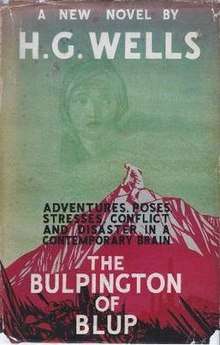The Bulpington of Blup
The Bulpington of Blup, a 1932 novel by H. G. Wells, is a character study analyzing the psychological sources of resistance to Wellsian ideology, and was influenced by Wells's acquaintance with Carl Gustav Jung and his ideas.
 First edition | |
| Author | H. G. Wells |
|---|---|
| Original title | The Bulpington of Blup: Adventures, Poses, Stresses, Conflicts, and Disaster in a Contemporary Brain |
| Illustrator | George Picken |
| Country | United Kingdom |
| Language | English |
| Publisher | Hutchinson & Co. |
Publication date | 1932 |
| Pages | 414 |
The inner life of the protagonist, Theodore Bulpington, is dominated by a complex he calls "The Bulpington of Blup." This self-regarding, romantic, heroic personality comes over time to dominate his existence, falsifying his relations with the world. Theodore Bulpington develops into a pretentious fraud who finally affirms a modus vivendi of falsehood: "I am a lie. I accept it. I am a liar in a world of lies."[1] The novel is also of interest for its extended analysis of psychological responses to World War I.[2]
The life of Ford Madox Ford inspired some aspects of the novel.[3] The Bulpington of Blup is dedicated to Odette Keun, Wells's lover from 1924 to 1933.
Like Mr. Blettsworthy on Rampole Island and The Autocracy of Mr. Parham, The Bulpington of Blup did not sell as well as Wells's earlier novels; these are now among his "least read books," according to biographer David Smith.[4] Wells believed that the novel was as good as Kipps, but critics have not shared this view.[5]
Censorship
The Bulpington of Blup contains several sexual scenes, and also contains passages critical of the Roman Catholic Church. For these reasons, the book was banned in both the Irish Free State and Francoist Spain.[6][7]
References
- H.G. Wells, The Bulpington of Blup (New York: Macmillan, 1933), p. 408.
- H.G. Wells, The Bulpington of Blup (New York: Macmillan, 1933), Ch. 6 & 7.
- Michael Sherborne, H.G. Wells: Another Kind of Life (Peter Owen, 2010), p. 303.
- David C. Smith, H.G. Wells: Desperately Mortal: A Biography (New Haven and London: Yale University Press, 1986), pp. 297-302.
- Michael Sherborne, H.G. Wells: Another Kind of Life (Peter Owen, 2010), p. 303.
- "Books Banned In Ireland:Australian Authors And H. G. Wells".The Sun 15 July 1937.
- Patrick Parrinder and John S. Partington, The reception of H.G. Wells in Europe. London : Thoemmes continuum, 2005. ISBN 9780826462534 (p.251)